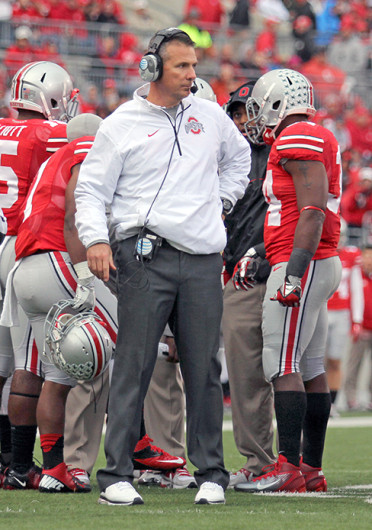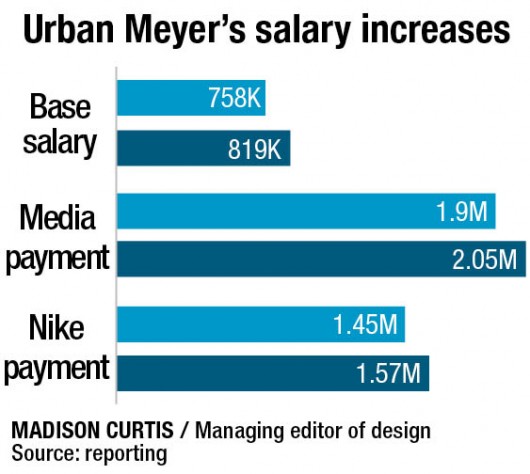
OSU coach Urban Meyer stands during a game against Iowa Oct. 19 at Ohio Stadium. OSU won, 34-24.
Credit: Lantern file photo
Although he’s yet to win a National Championship or a Big Ten Championship trophy at Ohio State, Urban Meyer received an 8 percent raise following the 2013 football season. The football coach’s latest performance review also showed he needed to be engaged with various groups because of recent changes with the NCAA governance structure and consideration being given to new benefits for student athletes.
After he amassed a 24-game regular season winning streak to start his tenure at Ohio State, Meyer received a raise of exactly $328,640 over his three areas of income — base salary, media payment and Nike payment — heading into the 2014 campaign.
In a letter obtained by The Lantern addressed to Meyer from OSU vice president and athletic director Gene Smith, Smith congratulates Meyer on “another remarkable season” before listing the annual salary increase for the head coach. The letter was dated March 25.
A university policy says a compensation package exceeding $350,000 — which Meyer’s does — must be approved by the president and the provost, according an OSU document. Joseph Alutto was serving as interim president and Joseph Steinmetz was serving as provost at the time Meyer’s raise was approved.
Meyer’s base salary jumped to $818,640 from $758,000, his media payment went to $2.05 million from $1.9 million and his Nike payment increased to about $1.57 million from $1.45 million annually.
The letter concluded with Smith informing Meyer that the change in his contract would become effective Feb. 1 and would be reflected on his March 31 paycheck.
Smith told The Lantern that the raise was nothing out of the ordinary.
“It was part of the normal evaluation process we have each year,” Smith said in a Saturday email.
Meyer’s initial contract at OSU was signed as a six-year, $24-million deal, but has since undergone various revisions throughout his time with the Buckeyes.
In 2012, the OSU Board of Trustees approved changes to Meyer’s contract that included bonuses of $50,000 for any Big Ten Leaders Division championships. Meyer’s initial contract also included bonuses of $100,000 for a Big Ten Championship, $150,000 for a non-national championship BCS bowl game and $250,000 for a National Championship Game appearance.
Meyer’s latest performance review — which was sent to The Lantern on Nov. 12 to fill an open records request — was conducted by Smith on June 3 and was overall positive.
Smith thought Meyer exceeded expectations (out of three possible categories, “exceeds expectations” is the best) in four out of eight core competencies. These included commitment to compliance, student-athlete welfare, leadership and public and donor relations.
Smith thought Meyer met expectations (which is the category between “exceeds expectations” and “opportunity for improvement”) in the remaining four categories. These included academic success of the program, competitive success of the program, communication and budget management.
The performance review also included an “overall rating” box that was left blank. Above the box read text that said an overall rating must be given for all employees.
When asked about the blank box in a Wednesday afternoon follow-up email, Rebecca Dickson, a paralegal and program manager in the public records office who sent the original documents, said she would work on getting an answer.
In a June 3 letter from Smith to Meyer attached to the performance review, Smith said he needed Meyer to “continue to focus on the academic initiatives” of the team.
Smith also said Meyer needs to be engaged with his “national organization” and the Big Ten Coaches group, because of changes in the NCAA governance structure and consideration being given to adding benefits for student athletes, which potentially pays them outside of cost of attendance.
Under the former NCAA governance model, athletic directors and student athletes did not have a voice in the legislative process, but under the new model they do.
“We need to be sure our position is properly represented with these groups,” Smith said.
Smith also praised Meyer’s approach to developing the “total student athlete,” calling it “one of the best.”
He said Meyer has created an environment where players can strengthen their values, learn life skills and strive for excellence in all that they do.
Smith said he was proud of the way Meyer led the coaching staff. He said there is “clarity” in the roles, expectations and value.



